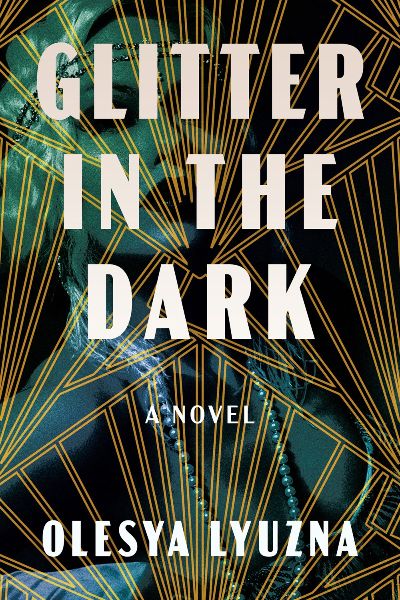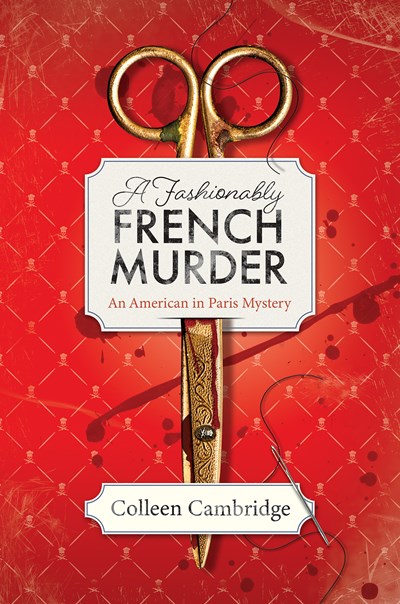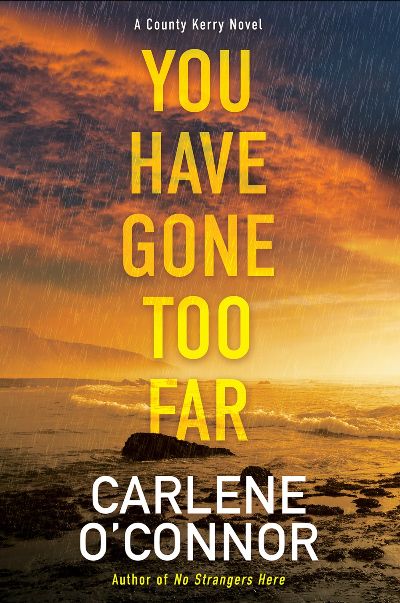Shelby is returning home, not by choice. Her career managing a graphic-arts company is over as the company was sold, taking with it her hopes for romance with her boss. She’s had a pretty soft landing, though. Her parents are taking a month-long road trip, leaving her to manage the family needlework shop with the free apartment above. Why isn’t she happier? She feels the judgment of nearly everyone around her, from her practically perfect older sister to her old high school mate Kat who has been vying to take over the shop herself. Kat runs her own business, sharpening knives and scissors and designing and selling needlepoint canvases and high-end scissors. The first weekend that Shelby will be in charge, the shop will hold a trunk show of Kat’s merchandise. When Kat doesn’t show up to help prepare, Shelby goes looking for her, finding her in her mobile sharpening van with a knife in her chest. The police and all others rule this a terrible accident, but not our Shelby. Her unauthorized sleuthing isn’t the only tension in the story. She needs to run the business, maintain the proper position in the community and deal with her sister’s tacit criticism of whatever she does. To assist her, Shelby starts building a community of needlepointers of her own age group, men included, and of course adopts a stray cat. The charming town, Shelby’s renewed love of needlework, and her growing group of friends will have readers eagerly awaiting the next installment. Just as many cozy mysteries include recipes, this one ends with needlepoint patterns.
Mystery & Detective
We are taken back to the roaring ’20s, to speakeasys and the Ziegfeld Follies, in this gritty noir with Ginny Dugan as our main character and sleuth. She and her dancer sister have come to New York from Kansas. Dottie, the sister, dances for the Follies, and is engaged to Charlie, a financial guy from home; Ginny writes an advice column for Photoplay, though keeps angling for real, hard-nosed reporting. Ginny is out partying at a speakeasy when she’s a witness to the kidnapping of Josephine, a headliner who is Black, but her story is not believed. People are dying of heart attacks in Harlem dance clubs, and dancers are reporting ghosts in the dressing rooms of the Follies, young women who have been murdered. There are drug stashes and secret crime bosses. Ginny partners with Jack, a detective, but it is Gloria, a Follies star, who calls to her heart. The level and complexity of the crime speaks to a mastermind: the Eagle, whose identity is unknown until the end. This debut turns back the clock with authentic detail and sharply drawn characters and a strong sense of violence and lawlessness. A challenging book.
Expat Tabitha King—formerly of suburban Detroit—is living, as the kids would say, her best life. She’s upped and moved to post-war Paris—she’s bilingual thanks to her mother and French grandmother—and this third, and best, in the mesmerizing “American in Paris” series finds Tabitha hanging out with her chum Julia Child, from whom she picks up some much-needed cooking tips. She’s also settling disputes between her Grand-père and his partner, Oncle Rafe (they are reopening a restaurant, thus the agida) and dipping her toe in the heady world of haute couture, with Christian Dior, who makes a cameo appearance, leading the way with his “New Look.” But when Tabitha discovers a body in one of the exclusive fashion ateliers, all the frothy fun comes to a halt, or at least a sputter, as Tabitha, with the sometime help of the all-too-handsome Inspecteur Merveille, throws herself into the search for the murderer. It’s a search that takes Tabitha back to Paris during the Occupation and the work of the Resistance against the Nazis and the French Vichy government, as well as those whose role was less clearly defined. Rich in history, full of the value of friendship and family, and with a very, very slow-growing romance (we want more, Colleen!) this is certain to be one of the best mysteries of 2025.
Eight months after a traumatic on-the-job accident almost killed her, George (Georgina) Lennox has been assigned her first case as a newly promoted Glasgow DI: to investigate the suicide of 18-year-old Alan Ferguson on a remote island in the Scottish Hebrides. A disappointed George protests to her boss: “Because nothing happens out there. These islands are medieval time capsules with a population of relics.” Arriving on the stark and barren Eilean Eadar with her partner, Richie Stewart, she finds an isolated community that still clings to its ancient Catholic faith (in Protestant Scotland) and that is deeply suspicious of outsiders. As George and Richie interview the locals, George senses that something is off about the place and its people. Mysterious double spirals are engraved into the village houses and farm crofts. The long abandoned lighthouse where Alan fell is also the site where three lighthouse keepers disappeared mysteriously a century ago. Late at night, George hears the howling of a wolf and spots a masked figure outside her window. Who is trying to thwart the investigation? At the same time, George and Richie clash over the DI’s use of prescription pain medication and her reckless tendency to charge into risky situations without backup. George is a compelling sleuth, tough yet also vulnerable and not always likable, but she has great chemistry with the fatherly Richie. Debut author McCluskey has written a compellingly spooky and creepy mystery with a hint of folk horror à la The Wicker Man. Fans of Ann Cleeves’s Shetland crime novels and Peter May’s Lewis Trilogy will delight in this atmospheric thriller.
Cleeves, well noted for Vera, Shetland, and others, first wrote a very different series of mysteries that are soon to be newly available in the United States. George and Molly Palmer-Jones are our amateur sleuths. George, retired from the Home Office (we don’t really know what he did while working), and Molly, a retired social worker, make a wonderful team. Steady, trustworthy, George, with authority; warm, sweet, Molly with the ability to get people to talk to her, make an excellent alternative to the police that no one seems to value. Tom French, a young and seemingly popular leader of the local “twitching” community, a group that travels to find rare birds, is found murdered. The father of a local asks George to look into it. The body has been moved and it is not apparent how or why. George, a birdwatcher himself, can maintain a connection to the astonishing rivalries and intrigues involved in this rabidly passionate community, the members of which travel great distances and endure privations at the merest hint of a rare-bird sighting. The lives and personalities of Cleeves’s characters are complicated and unexpectedly overlapping, and while Molly quietly seeks to understand the human aspect of the crime, George travels for information. This is a wonderful example of the genre. The characters are strong and beautifully drawn, and the landscape integral to the story. Best of all, there is a message from the author discussing her circumstances when writing this and critiquing a work that she obviously loves. Happy to say, there will be more to come.
Amanda Flower’s Emily Dickinson series just keeps getting better and better. It’s 1857 and Amherst, Massachusetts is experiencing one of the worst winters anyone can remember. Along with the freezing cold is the fear of chimney fires, and indeed an out-of-control blaze in Kelley Square, the Irish section of town, kills a young family, with the eight-year-old daughter, Nora Rose, the sole survivor. But the blaze has suspicious origins, and Emily and her maid Willa take it upon themselves to investigate. There is a lot going on in this novel, but it is all handled with great deft. Emily’s ongoing reliance upon Willa sets the maid apart from the other household staff, fostering jealousy. The marriage of Emily’s brother, Austin, and his wife,, Susan, continues to deteriorate. Women’s role in society, especially in marriage, is a source of ongoing debate. The future of the now-orphaned Nora Rose, an Irish Catholic girl in a largely Protestant town, and with no relatives, upsets the Dickinson household. Meanwhile, Willa’s own love life takes a dramatic turn. A great choice for book groups, which will appreciate both the book’s breadth and depth. Readers who enjoy this title may also like Mariah Fredericks’s The Wharton Plot and Kate Khavari’s A Botanist’s Guide to Parties and Poisons.
O’Connor’s latest Ireland-set novel is darker than her previous titles, but will still work for her many fans. Steadfast, kind veterinarian Dr. Dimpna Wilde is back, and this time life in her hometown, tourist hot-spot Dingle, Co. Kerry, is repeating itself in a macabre way. Only locals remember that 29 years ago, a cult centered around two men’s obsession with pregnant women ended in death and the men being sent to prison. They’re out now, and horrifyingly seem to be at it again, as a pregnant woman is found dead in a bog near the town and another is missing. A local child has been snatched, too, and Dimpna’s love interest, Detective Inspector Cormac O’Brien, is on the case, desperate to find the missing locals. An officer who worked the previous case threatens to destroy this one with her fixation on the just-released men. The best and the worst of small-town life come together here to great effect, and the nail-biting chronicle of the missing duo’s ordeal, with the pregnancy clock ticking, makes for an engrossing read that’s topped off by an exciting, satisfying ending. A realistically portrayed deaf protagonist adds texture to the story. While you’re waiting for this terrific read, watch a documentary with elements of similarity: Gloriavale: New Zealand’s Secret Cult.
This marvelous tale of marriages that go awry and of friendships that save the day is certain to be one of the funniest crime stories of 2025. Four couples—close friends for 30 years—look forward to their retirement in Florida, their days idle and carefree. To guarantee even more money, the husbands, working off a tip, draw down their life savings and invest them in funds that quickly disappear—leaving them broke and their marriages even more miserable. But when one of the husbands dies, the wives are shocked to discover he left behind a life-insurance policy worth a whopping seven figures. In fact, the wives discover, all their husbands have identical policies. But what’s the use of life insurance when the men could live another 20 years? So the women decide to take matters in their own hands, or at least the hands of an accomplished hitman. But will the husbands be able to outplay their wives? Full of great characters who bring their own fun to the party, this book is perfect for readers who have enjoyed Everyone in My Family Has Killed Someone, The Author’s Guide to Murder, and A Serial Killers’ Guide to Marriage
In this latest visit to the lighthouse library on the outer banks of North Carolina, locals await a YA book festival featuring a recently local and very popular author of a fantasy series. Our librarian and amateur sleuth, Lucy MacNeil, is surprised to find this gentleman on her doorstep wanting to talk. She escorts him to the deck, goes to retrieve refreshments, and returns to find him dead of an arrow shot. To say that chaos ensues is an understatement. The new widow has political ambitions and intends to use this to launch her campaign, local teen ultrafans of the author set up a shrine invading Lucy and her husband’s privacy, and two lesser local authors battle it out for the now vacant top spot on the festival program. The clever policing by the local force is, of course vital, but, as usual, the little details that our research-minded librarian provides begin to tie things together, though the culprit may come as a surprise. The local color and community spirit shine, and the quirky personalities are never more so. While this is certainly a cozy, it is never dull. The ending leaves clues promising changes, so readers will look forward eagerly to the next installment.
Bregman takes the history of Alexander Hamilton and his legacy, mixes it with a modern-day conspiracy, and delivers a fun and engaging read. Elizabeth Walker is the last heir of the Hamilton family line, and when she passes away, that’s it. During research, Elizabeth uncovers a key created during Hamilton’s life. On her way home after, she’s followed, and in the New York subway, rather than have the key taken, Elizabeth texts her best friend, Sarah Brockman, to contact Elizabeth’s husband, Ralph. Then she jumps in front of an oncoming train. Sarah, devastated by Elizabeth’s death, receives a box of documents her friend sent over before her death. Working with Ralph, they are shocked to learn that a secret society established by Hamilton still exists today. The bedrock of this society has kept the United States strong all these years. Still, sinister forces want to destroy the States, and they have plans to use Hamilton’s legacy to cause economic chaos by eliminating the foundation of the American dollar. Bregman has crafted a page-turning thriller of history and the financial world that will have readers wondering if any of the story could be real. Steve Berry and Dan Brown fans will want to add this to their reading list.










